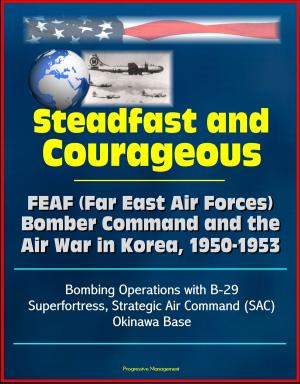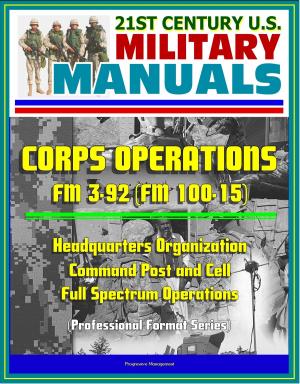Deterrence During Hostilities: A New "Triad" for the Middle East - Strategic Deterrence, Retaliatory, Preemptive, Nuclear, Chemical, Deception, Psychological Operations, Shaping Enemy Expectations
Nonfiction, History, Military, Strategy, Middle East| Author: | Progressive Management | ISBN: | 9781311364180 |
| Publisher: | Progressive Management | Publication: | June 20, 2016 |
| Imprint: | Smashwords Edition | Language: | English |
| Author: | Progressive Management |
| ISBN: | 9781311364180 |
| Publisher: | Progressive Management |
| Publication: | June 20, 2016 |
| Imprint: | Smashwords Edition |
| Language: | English |
This excellent report has been professionally converted for accurate flowing-text e-book format reproduction. Due to the presence of weapons of mass destruction and the will to employ them in the Middle East, the operational commander of the next conflict must understand and employ a new deterrent triad. This triad is composed of the strategic, operational, and tactical levels of deterrence. He must frustrate the potential enemy's ability to develop NBC weapons through cooperative and unilateral initiatives. He must sap the enemy's will to employ them through the promise of retaliation, the promise of limited objectives, and the fact that friendly forces are ready to operate in the hostile NBC environment. The operational commander must frustrate the determined enemy's effort to target his weapons by blinding him to friendly troop locations and intentions and by maintaining a superior operational tempo. The safety and effectiveness of friendly forces engaged in future conflict can only be maximized by approaching deterrence as a multi-level endeavor. This deterrer focus to campaign planning will not detract from the war effort. Current Marine, Army, and Air Force doctrine naturally support it However, to work, it must be intelligently orchestrated - it will not happen just because the doctrine supports it. As the warfighting professional, the operational commander must conduct future campaigns with an integral, multi-level deterrent focus. It will be his responsibility to maintain a viable force in theater, and thus it will be his responsibility to execute the new triad for the Middle East.
This excellent report has been professionally converted for accurate flowing-text e-book format reproduction. Due to the presence of weapons of mass destruction and the will to employ them in the Middle East, the operational commander of the next conflict must understand and employ a new deterrent triad. This triad is composed of the strategic, operational, and tactical levels of deterrence. He must frustrate the potential enemy's ability to develop NBC weapons through cooperative and unilateral initiatives. He must sap the enemy's will to employ them through the promise of retaliation, the promise of limited objectives, and the fact that friendly forces are ready to operate in the hostile NBC environment. The operational commander must frustrate the determined enemy's effort to target his weapons by blinding him to friendly troop locations and intentions and by maintaining a superior operational tempo. The safety and effectiveness of friendly forces engaged in future conflict can only be maximized by approaching deterrence as a multi-level endeavor. This deterrer focus to campaign planning will not detract from the war effort. Current Marine, Army, and Air Force doctrine naturally support it However, to work, it must be intelligently orchestrated - it will not happen just because the doctrine supports it. As the warfighting professional, the operational commander must conduct future campaigns with an integral, multi-level deterrent focus. It will be his responsibility to maintain a viable force in theater, and thus it will be his responsibility to execute the new triad for the Middle East.















